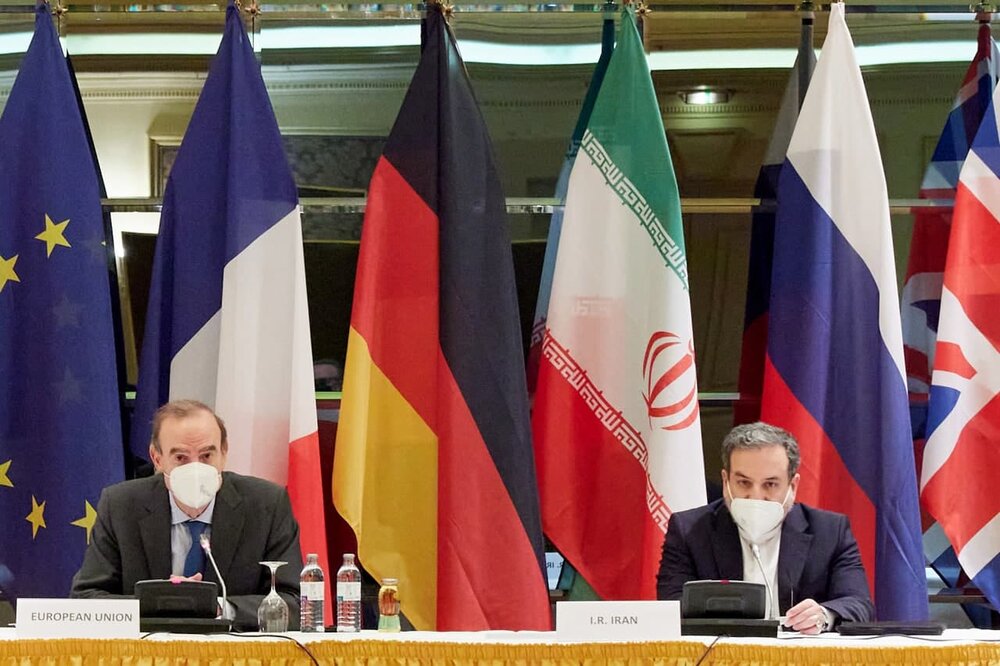EU sanctions meant to derail JCPOA talks, Araghchi says

TEHRAN - Iran’s Deputy Foreign Minister for Political Affairs Seyed Abbas Araghchi said Iran criticized the European countries during the latest round of nuclear talks in Vienna for imposing so-called human rights sanctions on Iran and ignoring recent sabotage at a key Iranian nuclear plant.
Araghchi said the new EU sanctions are meant to undermine talks on the Joint Comprehensive Plan of Action (JCPOA) and the deal altogether.
“The Europeans not only ignored this important act of sabotage, but also they were busy imposing new sanctions on Iran and that was totally unacceptable,” Araghchi told Press TV from Vienna.
In the early hours of April 11, sabotage at the electricity distribution network of the Natanz Fuel Enrichment Plant caused a blackout and the disruption of the operations of this sensitive nuclear facility, according to a letter sent by the Iranian Foreign Minister Mohammad Javad Zarif to UN Secretary-General António Guterres.
Zarif described sabotage as a “war crime”.
“The deliberate targeting of a highly sensitive safeguarded nuclear facility—with the high risk of potential release of radioactive material—constitutes reckless criminal nuclear terrorism. Considering the possible indiscriminate human and environmental consequences of this international crime, those who planned, ordered, participated and carried out this cowardly act committed a grave war crime; one that must not go unpunished. Any power with knowledge of, or acquiescence in, this act must also be held accountable as an accomplice to this war crime,” he said.
“EU sanctions were JCPOA-related”
In the midst of the uproar over the sabotage, the EU imposed sanctions on several Iranian individuals and entities for alleged violation of human rights, a move that enraged Iran during the sensitive Vienna nuclear talks.
The EU claimed that its sanctions were not related to the JCPOA. But Araghchi said he told the Europeans that these sanctions were JCPOA-related.
“We told them that even your human rights sanctions that you imposed two days ago, we consider them as JCPOA-related sanctions because right in the middle of negotiations you decided to impose sanctions and that is certainly [meant] to undermine the current negotiations and to undermine the JCPOA altogether,” he noted.
Pointing to the new sanctions, the chief Iranian negotiator said this is a significant non-performance by the European Union.
Iran condemned the European Union for putting the names of several Iranian officials and institutions on its human rights sanctions list.
“The Islamic Republic of Iran strongly condemns this move and considers it invalid,” Saeed Khatibzadeh, the Iranian Foreign Ministry spokesman, said last week after the EU announced the sanctions.
“Such acts are committed by those who claim to be supporters of, and falsely preach [respect for] human rights with political motives, but they have not only remained silent in the face of violations of Iranian people’s rights due to the United States’ inhuman and illegal sanctions but also approved of such violations," he noted.
"Such acts are rejected and will further disgrace those who abuse lofty concepts such as human rights,” said the spokesman.
“In reaction to this EU move, the Islamic Republic of Iran’s Ministry of Foreign Affairs suspends comprehensive talks with the European Union, including human rights discussion, and all cooperation thereof, especially in the domains of terrorism, narcotics and refugees,” Khatibzadeh noted.
“In reaction to this move by the European Union, the Islamic Republic of Iran is considering [imposing] reciprocal sanctions, which will be announced in due time,” he said.
Diplomats from Iran and the P4+1 are in the Austrian capital to discuss ways to revitalize the 2015 Iran nuclear deal. The talks were described by all parties as constructive and moving forward, although they acknowledged that the Vienna talks are difficult.
“Very tough exchanges of views”
Araghchi said the participants had “very tough exchanges of views” at the Thursday session of the JCPOA Joint Commission, but they all agreed to move forward.
“Although we still have differences, we share this common interest that we have to move forward, and we have to expedite this process in order to come to a conclusion as soon as possible,” he pointed out.
If there is good faith on the U.S. side, Araghchi continued, the way is quite clear.
“I don’t think we can make progress without a list of sanctions”
“They have to lift all sanctions and we need the list of sanctions and this should be our job in this round of discussion,” he said, asserting that without a list, “I don’t think we can make any progress.”
According to Araghchi, Tehran is also prepared to make a similar list on the nuclear measures that it should take.
“With this understanding, the Joint Commission decided to mandate the two working groups on the nuclear and sanctions-lifting [parts] to re-start the job this afternoon and try to make a concrete, specified list of measures to be taken by Iran and the U.S.,” he stated.
The deputy foreign minister further underlined the need for the U.S. to prepare a list of sanctions, because without it “nothing will happen.”
“I cannot say that I am optimistic, but I think we are on a good track, although we had the negative impacts of last days’ developments and we have to somehow manage that,” he remarked.
Araghchi said the list of sanctions should also include third parties who have been sanctioned because of their cooperation with Iran.
“Before we see the list, we cannot judge whether it is as complete as we want or not,” he pointed out.
Iran has also said that it will need to verify the lifting of sanctions by the U.S. before reversing its nuclear activities that were done in response to the U.S. withdrawal from the JCPOA in May 2018.
Leave a Comment